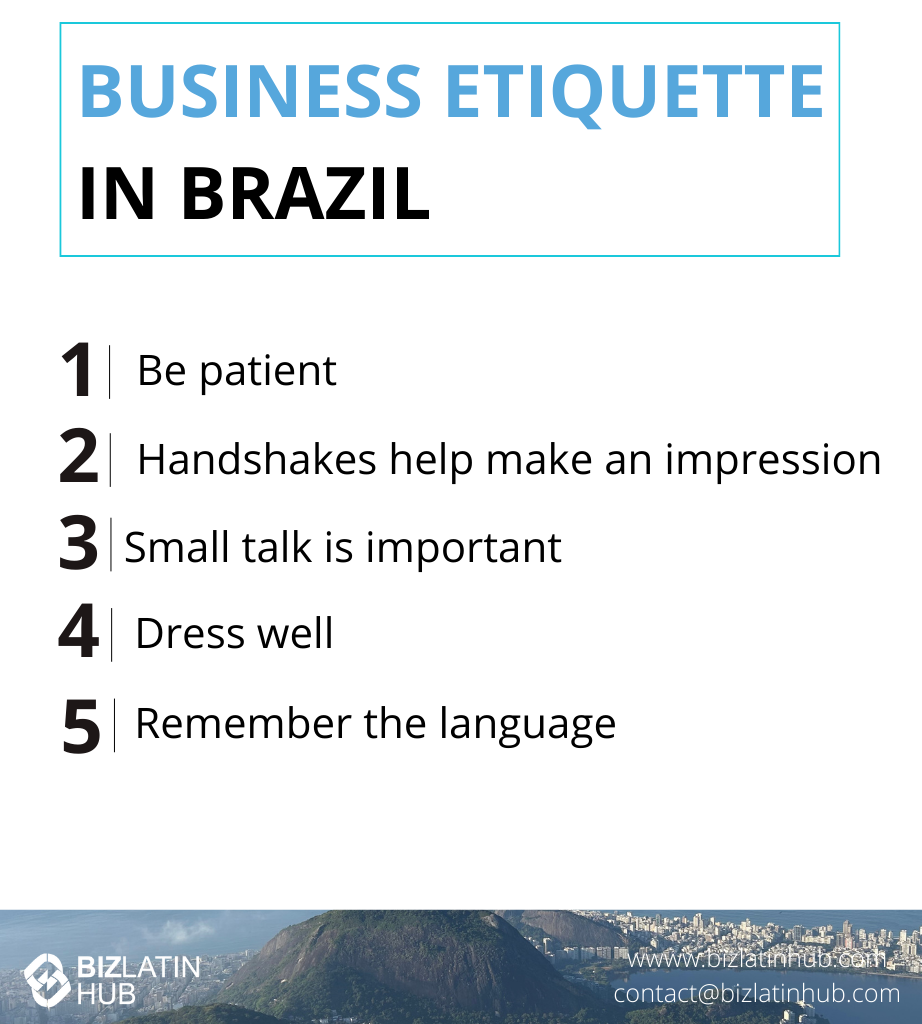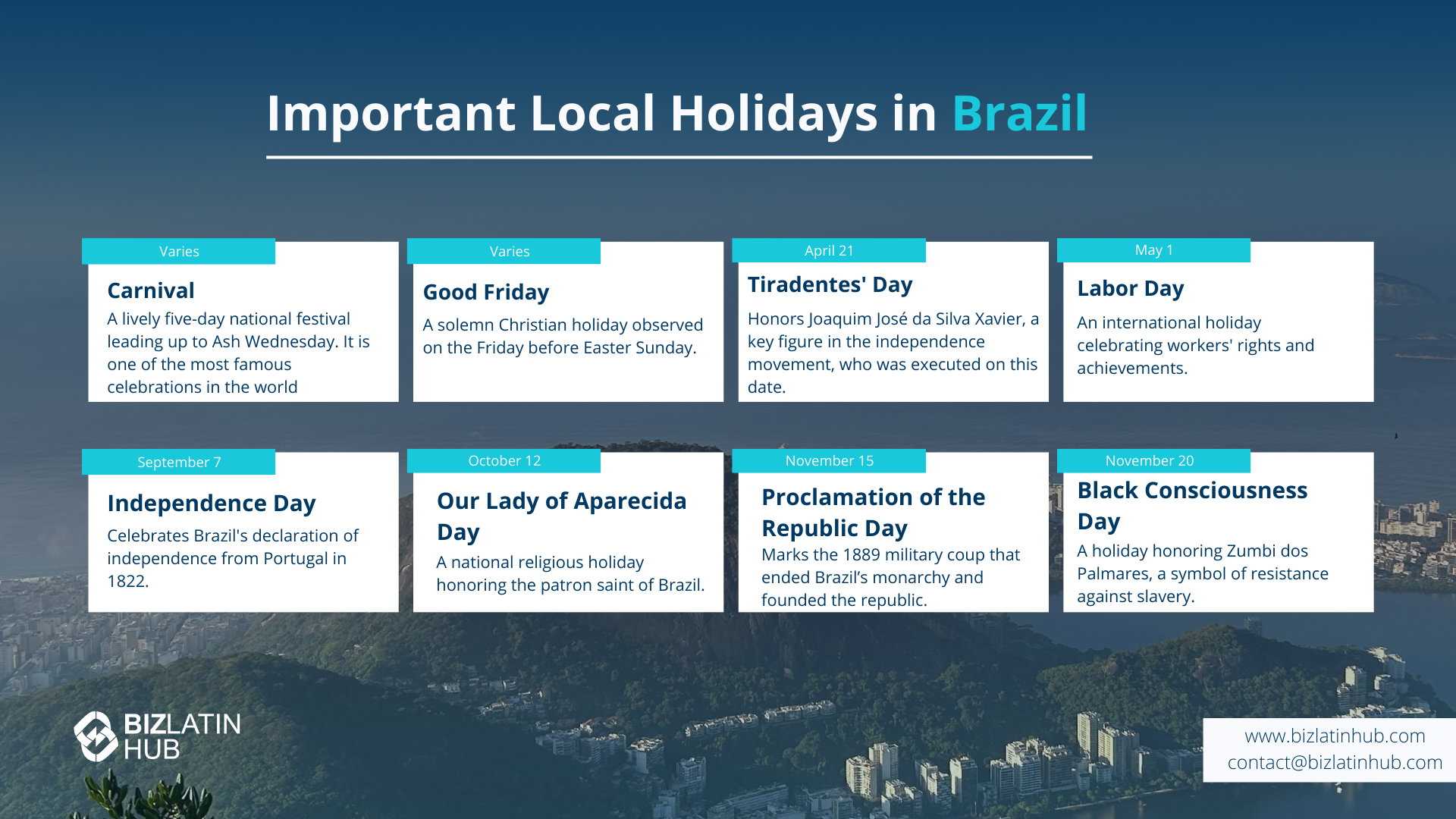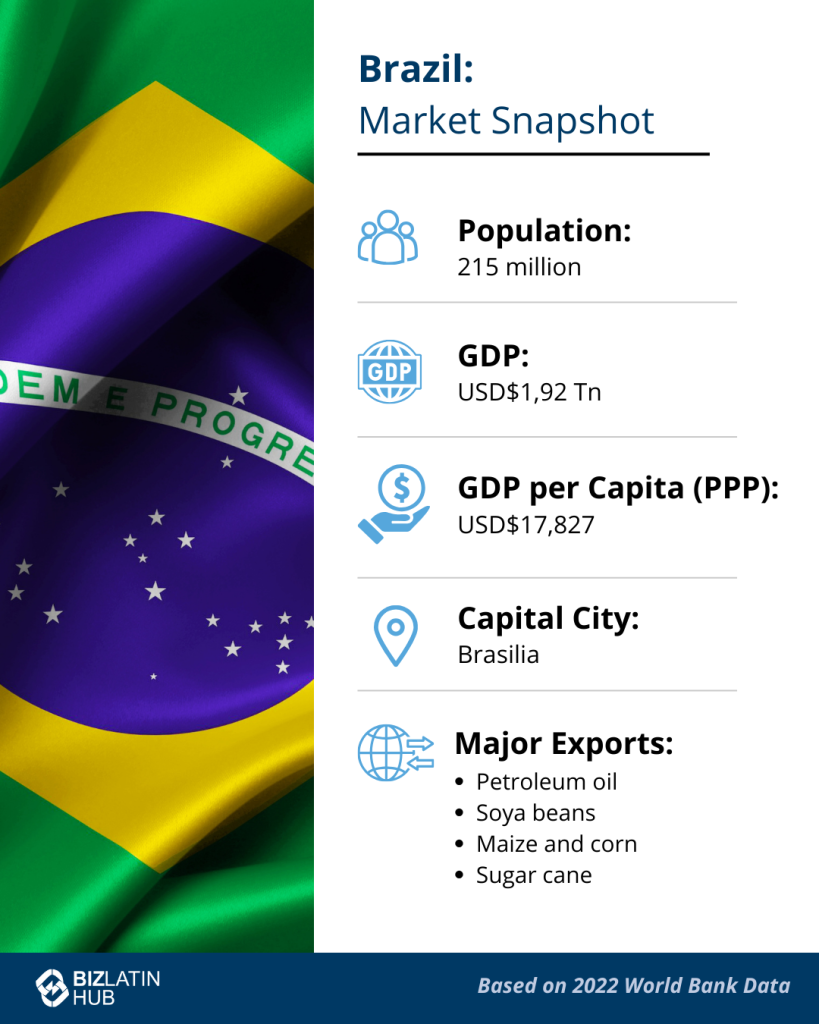Understanding the business culture in Brazil is easy once you are used to it, but can be intimidating for newcomers. That’s where Biz Latin Hub steps in. We can help you set up shop in the country while you acclimatize to the way of doing things. Better yet, our array of back-office services means we offer ongoing in-country support at any stage of the business life cycle, including LLC formation in Brazil if necessary.
Biz Latin Hub has supported foreign investors in Brazil for over a decade—our guide reflects real-world insight into the country’s diverse and relationship-based business environment.
Key takeaways on business etiquette in Brazil
| Are personal relationships important for business etiquette in Brazil? | A great deal of importance is placed on building personal relationships and making a good impression from the start. |
| Is punctuality important when doing business in Brazil? | While some areas of the country might be more flexible with time than you are used to, this certainly isn’t the case everywhere. |
| Is remote working popular in Brazil? | While business culture in Brazil means employers rarely offer remote working, employees like it and are willing to work remotely for overseas employers. |
| Is it necessary to speak Portuguese to do business in Brazil? | Clear communication in English and Portuguese will help both with business matters and with building those personal relationships. |
| Do regional differences exist in Brazil? | Business culture in Brazil varies depending on where you are in this enormous territory. |

Business Culture in Brazil: 5 simple steps to success
Remember that these are general guides. You may well find that the north is more relaxed about timings compared to the south, or that Spanish is more widely spoken in cities near the borders with hispanophone countries. Business culture varies across regions.

São Paulo tends to be more formal, punctual, and structured, whereas the Northeast—including Salvador and Recife—is more relaxed, flexible, and informal in approach. However, these are a good guide to getting things done all over.
Brazilian companies often have centralized decision-making processes. It’s essential to identify the key decision-maker early in negotiations and direct important communication to them. Hierarchy matters—senior leaders expect deference and may not appreciate being bypassed in communications.
- Be patient.
- Handshakes help make an impression.
- Small talk is important.
- Dress well.
- Remember the language.
1. Be patient with the business culture in Brazil
This will vary from area to area, but don’t be surprised if things sometimes work on a flexible schedule than you are used to. However, it’s also important to remember that it’s not everyone or everywhere, so don’t assume that timekeeping will be lax. Sao Paolo, for example, is a big exception to this: lateness will be taken very badly there.
Trust is everything in Brazilian business. Personal rapport is considered more important than the business proposal itself. Social interactions are essential for laying the foundation for future deals. It’s not uncommon for early meetings to focus entirely on non-business topics like football, family, or cuisine. Accepting a lunch or coffee invitation is often a sign that negotiations can begin.
2. Handshakes help make an impression
A firm and professional handshake is more than a simple business greeting here. Personal connections are a critical part of business culture in Brazil and people generally value warmth and friendliness.
In São Paulo, expect a firm handshake with direct eye contact. In Rio de Janeiro, greetings may involve a cheek kiss between acquaintances—even in business environments.
A kiss might also be a greeting between women – note that this is always an air kiss and often on both sides of the face.
Physical proximity is common during conversations—stepping back may be interpreted as distant or cold. Maintain eye contact and stay engaged.
3. Small talk is important
Connected to the previous point, Brazilians will spend time evaluating whether they can trust you to work well with them. That means not getting straight down to brass tacks and taking the space to be sociable and show that you will be able to have a good partnership.
Brazilians are expressive and passionate communicators. Interruptions during conversation are not seen as rude, but rather a sign of engagement and enthusiasm. Be mindful of non-verbal cues. Brazilians use gestures and facial expressions extensively—tone and emotion can carry as much meaning as words.
4. Dress well for business meals
Although Brazil may appear on the front of travel magazines as a land of beaches and linen shirts, that’s a world away from business centers, where formality is taken seriously. Wear dark suits, collars and proper shoes. This will show that you’re professional and taking things seriously.
Many business discussions happen over lunch or dinner. These settings are less formal but very important for building trust. Avoid diving straight into business—wait for your host to initiate. If invited to a home, bring a small gift such as wine or flowers. Avoid overly expensive or lavish items.
5. Remember the language!
While many Brazilians certainly speak Spanish, it’s not their mother tongue. Blithely assuming that you can speak Spanish because it is Latin America may even cause offense. Ask which language someone would like to work in before starting out. Any attempt – even just to say hello – to speak Portuguese will show a willingness to adapt.

FAQs on business culture in Brazil
These are some of the most common questions we receive from international investors interested in the business culture in Brazil.
1. Can a foreigner own a business in Brazil?
Yes, by either legal persons (legal entities) or natural persons (individuals).
2. Why do business in Brazil?
If you are thinking about expansion to the ‘giant of South America’, you will need to understand the business culture in Brazil. It’s not hard to understand why: with a GDP of USD$1.92tn, the country has a vast internal market. The financial center of Sao Paolo alone is home to 20 million people in the metropolitan area.
This makes it incredibly appealing as a business opportunity, with a thriving startup culture in Sao Paolo and a booming tech ecosystem across the country. Sectors such as e-commerce and fintech are especially interesting, with companies like nubank finding success both inside and outside Brazil.
3. How important are personal relationships in Brazilian business?
They’re fundamental. Brazilian business is built on trust, and personal rapport often determines whether a deal progresses. Expect several social meetings before formal discussions begin.
4. How formal should my attire be in Brazil?
In São Paulo and other business hubs, dress conservatively—dark suits and ties for men, and elegant, tailored outfits for women. In tropical areas like Rio or Recife, lighter fabrics are accepted but should still appear polished.
5. Is punctuality important in Brazil?
Yes, particularly in São Paulo and Brasília. However, in other regions, a delay of 10–15 minutes is not unusual. Always confirm meetings the day prior and remain flexible.
6. Can I speak English in business meetings in Brazil?
While many professionals in larger cities speak English, Portuguese remains the standard business language. Bringing a bilingual colleague or interpreter is highly recommended.
7. What role do social gatherings play in Brazilian business culture?
Social gatherings such as lunches or dinners are a crucial part of doing business. These events build trust and are often where key business signals and agreements begin to take shape.
8. Are business hierarchies strict in Brazil?
Yes. Brazilian businesses are typically hierarchical. Always show respect to senior executives and avoid bypassing authority when making proposals or requests.
Why do business in Brazil?

If you are thinking about expansion to the ‘giant of South America’, you will need to understand the business culture in Brazil. It’s not hard to understand why: with a GDP of USD$1.92tn, the country has a vast internal market. The financial center of Sao Paolo alone is home to 20 million people in the metropolitan area.
This makes it incredibly appealing as a business opportunity, with a thriving startup culture in Sao Paolo and a booming tech ecosystem across the country. Sectors such as e-commerce and fintech are especially interesting, with companies like nubank finding success both inside and outside Brazil.
Given the sheer size of both territory and population, business culture in Brazil has many regional differences. There is a friendly rivalry between Sao Paolo and Rio de Janeiro, for example. However, there are certain things that cut across the country, which is what this article explains.
Biz Latin Hub can help you understand the business culture in Brazil
While this guide is an excellent introduction to business culture in Brazil, it is always better to work with a local partner who is knowledgeable about the country’s business culture and customs.
Biz Latin Hub is the trusted local partner of many individuals and companies who have expanded their operations to the country and elsewhere in Latin America. Get in touch with our team of experts today and we will help you and your business expand in Brazil.
Learn more about our team and expert authors.






